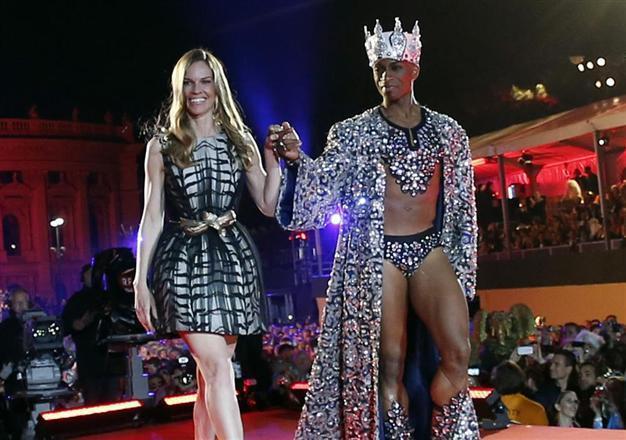Revellers brave cold to fight AIDS at Vienna ball
VIENNA - Reuters

U.S. actress Hilary Swank arrives for the opening ceremony of the 21st Life Ball in Vienna May 25, 2013. Life Ball is Europe's largest annual AIDS charity event and takes place in Vienna's city hall. REUTERS/Leonhard Foeger
Former U.S. President Bill Clinton, singer Elton John and actor Hilary Swank joined thousands of costumed revellers on Saturday at Europe's biggest AIDS charity event, Vienna's Life Ball.Dressed in skimpy costumes for the ball's 1,001 Nights theme, or simply in extravagant drag, party-goers braved unseasonally chilly temperatures of 8 degrees Celsius for the outdoor party.
UN Secretary-General Ban Ki-moon, addressing the gathering in a video message, urged the world not to let up in the fight against AIDS, which has killed 30 million people since the auto-immmune disease was first recognised at the start of the 1980s.
"A generation free of HIV (human immunodeficiency virus) is now in sight," he told the crowd in the gardens of Vienna's City Hall. "But unless we intensify our response, a million children could get HIV by 2015."
The annual ball, now in its 21st year, has grown from a small gay-community event to a society fixture, attracting celebrity guests from around the world.
Highlights included a Scheherazade-themed ballet, a fashion show by Italian designer Roberto Cavalli and a performance by singer Adam Lambert.
Those guests wearing costumes judged by the organisers' "style police" to be exceptional could win half-price admission to the Vienna ball, for which tickets cost up to 3,000 euros.
The event raised over 2 million euros ($2.6 million) last year, much of it donated to the Clinton Health Access Initiative to reduce HIV infection among babies in Africa.
Africa accounts for more than two-thirds of the world's cases of HIV, with 1.8 million new HIV infections and 1.2 million people dying of AIDS-related illnesses in 2011, according to the United Nations.

















